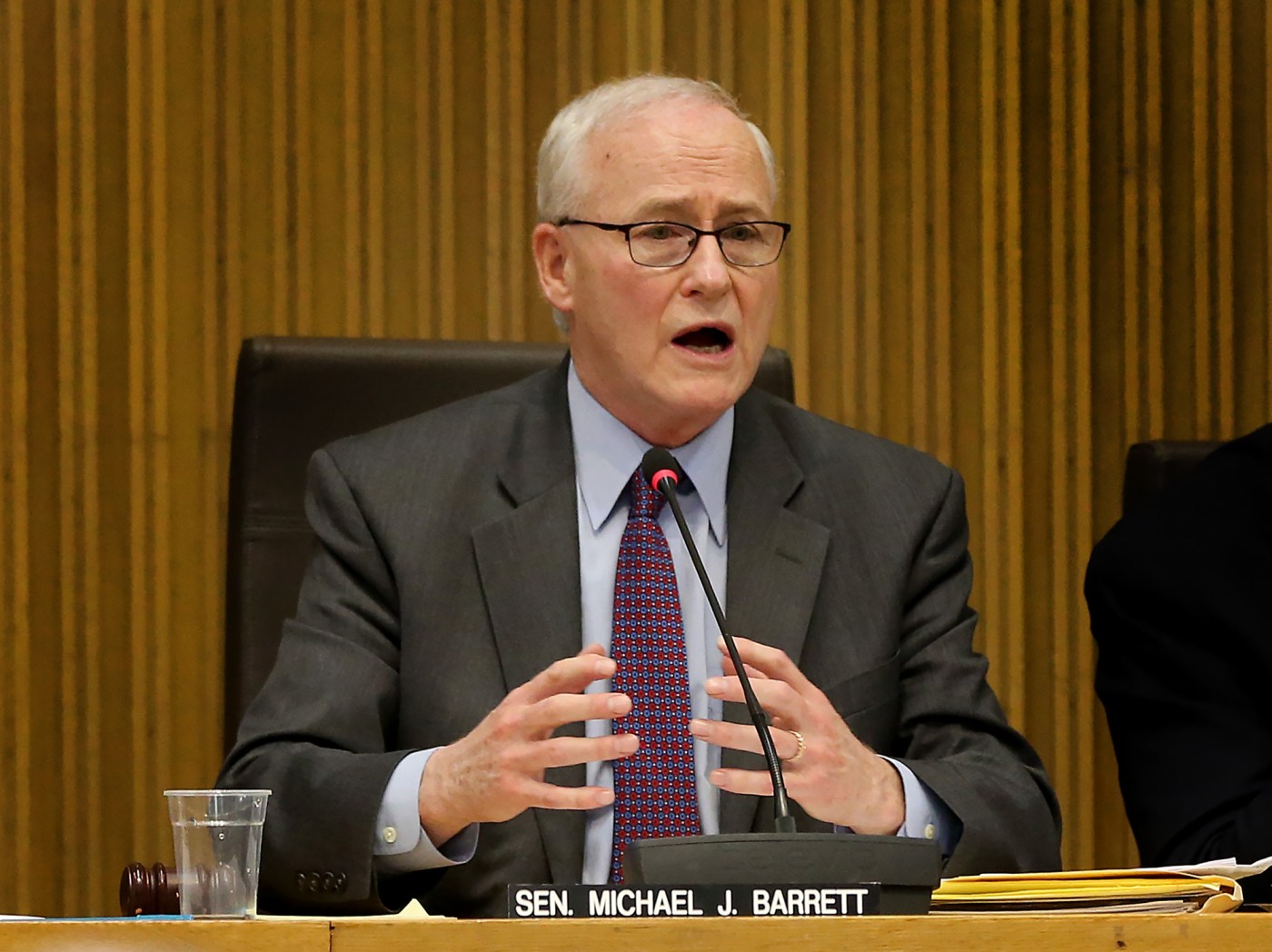
Claims of natural gas job losses because of Senate climate bill are ‘misinformation,’ Dem says
A top Senate Democrat contested claims that thousands of natural gas workers could be at risk of losing their jobs because of policies included in climate legislation the chamber was debating Tuesday, calling the assertions “misinformation” and “fundamentally flawed.”
Clean energy and climate legislation backed by Senate Democratic leadership attempts to reign in the use of natural gas and phase out an infrastructure replacement program by 2030, a move that has raised red flags among labor unions and conservatives on Beacon Hill.
But Sen. Michael Barrett, a Lexington Democrat and chief author of the proposal, said there is “plenty” of data on those who will be transitioning out of jobs in the natural gas industry as reliance on it fades.
“It’s not 10,000. It’s not 5,000. It’s not 1,000. As it turns out, several studies, some done based on federal data, some done based on Massachusetts data, show counts of well, in one case, 141,” Barrett said. “So what’s this thousands of jobs stuff? That’s misinformation. It’s sincerely offered, I think, but it’s fundamentally flawed. It’s wrong. It’s simply not supported.”
Resistance to the Senate bill bubbled up last week around language targeting natural gas, including the effort to end the gas pipe replacement program and another policy granting state regulators more authority to determine the scope of natural gas use in Massachusetts.
Republican Sen. Ryan Fattman of Sutton twice blocked the bill from moving forward last week, arguing lawmakers had little time to review the proposal and people could be out of work if natural gas use is tightened.
Another Republican, Sen. Patrick O’Connor of Weymouth, said last week that Democrats were “moving at warp speed without really taking into account the 20,000-plus union people that work inside of this profession right now.”
Barrett said he “can appreciate that transition sometimes cause inconvenience” and “it’s always a pain to change jobs.”
“We have to help people do that easily whenever we can. But just remember, every time you talk about the inconvenience of moving away from a fossil fuel job, you need to balance it with the lives you’re saving by moving off fossil fuels. Inconvenience is real. It’s a pain. Lives lost to fossil fuels are a reality too,” he said.
Later in the Senate debate, Sen. Mark Montigny appeared to push back on Barrett’s characterization of the transition away from natural gas and the impact it could have on jobs as an “inconvenience.”
Montigny, a New Bedford Democrat, said if Massachusetts is to “properly” wean itself off fossil fuels, “we better be mindful of that transition and the impact on jobs.”
Related Articles
Gov. Healey sends officials to southern border to ‘educate’ about shelter issues in Mass.
State senate releases $5.2B housing bill, rejects real estate transfer tax
Boston’s downtown office to residential conversion program gets $15M state boost
Seaport convention center could carry Thomas Menino’s name under House proposal
Pols & Politics: As time runs out, meeting state budget deadline only a ‘point of pride’ for one top Democrat
“When we look at the transition and the potential disruption of people’s lives, it’s not an inconvenience, it’s a disaster at times. I’m not suggesting, by the way, that (Barrett) doesn’t feel the same way, because he and I have shared these feelings with each other. But cost does matter,” he said.
In a June 25 letter, the New England Gas Workers Alliance, a group that represents industry unions, asked lawmakers to keep the pipe replacement program because more than 3,000 miles of “leak-prone pipe” in Massachusetts needs to be repaired to “prevent deadly conditions.”
New England Gas Workers Alliance President John Buonopane told the Herald he understands workers could lose their jobs if the program, known as the Gas System Enhancement Program or GSEP, sunsets, but his organization wants officials to understand the public safety impacts.
“The program wasn’t created to create jobs. It was created to address these public safety issues in relation to having leak-prone pipe in the ground,” Buonopane said.
Senate Majority Leader Cindy Creem said the bill “reorients” the GSEP program towards investment in clean heating whenever possible and allows gas companies to sell network geothermal energy.
“What we’re doing is saying we want to partner with the gas companies. We don’t want people to lose their jobs. We want those same people to work with us to find ways of clean energy,” the Newton Democrat said from the floor of the chamber.
Democrats pitched the larger Senate climate bill as instrumental in the state’s fight against climate change, curbing the use of fossil fuels, and lowering rates for consumers.
The proposal would expedite and streamline the siting and permitting process for clean energy projects, one of the key ways elected officials believe Massachusetts can meet its climate goals.
It directs utility providers to offer discounted rates to moderate-income consumers in addition to existing low-income customers and it bans competitive electric suppliers from enrolling new individual residential customers in contracts, among other things.
“The bill does all that while ensuring that the energy transition remains affordable for all residents of Massachusetts,” Creem said.
National Grid employees work on a natural gas line on Lowell Street in Woburn. (Jim Michaud/Boston Herald, File)


